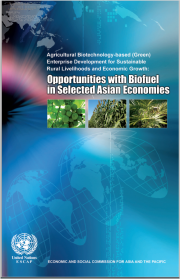
Agricultural Biotechnology-based (Green) Enterprise Development for Sustainable Rural Livelihoods and Economic Growth: Opportunities with Biofuel in Selected Asian Economies
Biofuels have a long history of use in different parts of the world but they were always found to be expensive and inconsistent in their quality and supply. In the mean time, crude oil as an option is falling out of favour because of the continuous increase in the crude oil prices, its adverse environmental impact and the international commitment to the Kyoto Protocol. The situation has motivated a growing number of countries to implement “bio-energy policies”. In terms of energy-equivalence, there is no major difference between petrol and ethanol as 1 litre of petrol has the same energy content as 1.5 litre of ethanol. This has prompted keen interest in the development of biofuels across the world. On a global level, production of biofuel is spearheaded by Brazil and the United States followed by China. Currently, about 70 per cent of global ethanol production comes from Brazil and the United States. In these two countries, biofuels have become part of the national strategy for economic development with a sharper focus on agricultural development. Such transition is also the result of environmentally conscious initiatives, including the U.S. oxygenated fuels program. Recently, the EU has also launched a major programme on biofuels, enumerated in the EU Biofuels Directive for development and import of biofuels.
